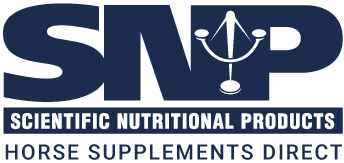Equine nutrition can be a minefield with a host of different feed products on the market and plenty of equestrian friends and experts only too willing to share their advice and tips on how to feed your horse. But do you ever feel like you are not sure what exactly your feed tag describes or are uncertain what your friend’s advice really means for your individual horse? Don’t panic; Scientific Nutritional Products is on hand to help in our latest blog sharing some the key terms in equine nutrition and explaining what they mean, so you can be an expert in your horse’s field! Dispelling myths and explaining unknown terms, Scientific Nutritional Products takes a look at our horse’s feed labels and the terms which appear on the bag in order to describe the list of nutrients and what they really mean! Top 11 Equine Nutrition Terms Explained
- Digestible Energy: the energy that is available to the animal by digestion. This can be measured by the difference between gross energy content of a feed and the energy contained in the animal's faeces (gross energy minus faecal energy). The more work your horse is in, the more digestible energy he requires.
- Crude Fats and Oils: the total amount of Fat & Oil in Feed. Oil is very high in slow release (non-heating) energy, horses digest it very well. Typical sources are soya, linseed and fish oil.
- Ash: Many people think ash is a waste product but ash is in fact the total mineral content of the feed.
- Crude protein: Crude protein, sometimes abbreviated to CP is the estimated protein in the feed determined by the amount of nitrogen in the sample taken.
- Acid detergent fibre (ADF)—A measure of fibre consisting mainly of cellulose and lignin. Cellulose is fermentable by microbes in the large intestine of the horse to generate some energy while lignin is entirely indigestible. Because of this, the higher the ADF value, the less digestible the feed is!
- Macrominerals: The macrominerals are known as the major minerals, essential to the body’s functioning. The seven macrominerals are; Calcium (Ca), phosphorus (P), magnesium (Mg), sulfur (S), potassium (K), and sodium (Na).
- Microminerals: Microminerals are those minerals for which the daily requirement is less than 1mg - 100mg. These are still very important to health and include such as iron (Fe), zinc (Zn), copper (Cu), selenium (Se), and manganese (Mn).
- Starch: Starch is a carbohydrate substance obtained chiefly from cereals. It is broken down in the small intestine to provide quick release energy. However if consumed in large quantities and reaches the hind gut it can be fermented leading to issues such as lamintis.
- Fibre – fibre is the most important part of a horse’s diet. Fibre is a structural carbohydrate which is broken down slowly in the large intestine by bacteria.
- Non-structural carbohydrates (NSC)—The fraction of a feed that contains mostly simple sugars and fructans. It is recommended that horses sensitive to glucose in their diet (for mental, digestive, or metabolic reasons) be fed a low (less than 10%) NSC diet.
- Fructan: A type of carbohydrate indigestible in the small intestines but readily fermented in the large intestine. Fructans can be associated with laminitis when consumed in high amounts. Fructan concentrations are highly variable in pasture, with higher concentrations in the spring and autumn and at the end of a sunny day as fructans can be produced through photosynthesis.


